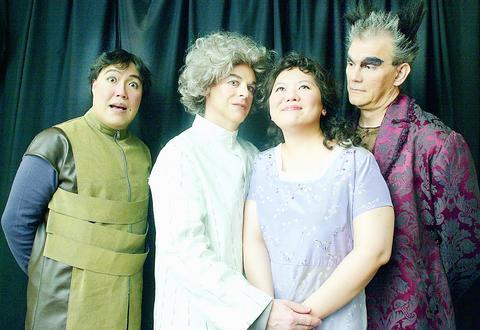Taiwan is cutting it fine in celebrating the 200th anniversary of the birth of France's most eminent Romantic-era composer, Hector Berlioz (1803 to 1869). It's true there have been other concerts featuring his music, but Wednesday's premiere of the semi-staged production of The Damnation of Faust falls on the last day of the year, a mere four and a half hours before the arrival of 2004.
Chien Wen-pin (

PHOTO COURTESY OF NSO
"I like what the director's doing with this work," said one of the four young dancers involved. "He's set it in the future and it isn't traditional like so many operas and the like. It's also going to be very erotic. I have to act out having sex with a girl, for example, and there's a lot more stuff like that as well."
And indeed at a costume and make-up try-out on Tuesday evening much of the talk was about the sexually explicit nature of the production by Yen Hung-ya, commonly known as Hung Hung (
"I have two scenes with the girl I'm in love with, Marguerite," said British tenor Justin Lavender, who plays Faust. "In one of them we're on a bed and the dancers show us all the things we could be doing there. In the other we're seen together in a bath." Someone else added that the film and slide projections were going to be "sort-of pornographic."
The title-role in Berlioz's drama is essentially the Romantic-era loner. When we first see him his dominant emotion is boredom. The dancing of some peasants bores him, as does the euphoria of a troop of soldiers. Then the devil appears in the form of Mephistopheles and says he'll show him some of the world's true pleasures. After they've looked in on some partying students, Mephistopheles shows him a girl, and then takes Faust to meet her. They fall in love, and it's only with difficulty that Mephistopheles separates them and, almost as an afterthought, persuades Faust to sign away his soul -- the traditional crux of the Faust legend.
"My reading of the story," said Hung Hung, "is that Faust stands for the intellect. He's unhappy and believes he's wasting his life. Mephistopheles, however, shows him sexual desire and bodily love. He actually helps Faust, and is in fact more human than he is."
Hung Hung is best known to Taiwan audiences for his movie The Human Comedy (
Science fiction for Faust
For this production he is transposing the story into the world of science fiction. Faust will be shown as a scientist conducting experiments, while Mephistopheles will stand for the opposing claims of the senses. The dancers will be Mephistopheles' assistants, and some of the interlude music in the score will be accompanied by mimed interaction between the main characters. When Mephistopheles leads Faust off to hell, they'll depart on a pair of brightly-colored toy motorbikes.
This approach, following Taipei Symphony Orchestra's excellent Salome last October, marks the arrival in Taiwan of the style, now well-worn elsewhere, of playfully undermining great classics with bizarre productions possessing their own quasi-independent agendas. Certainly Hung Hung's scenario appears to contrast with the grandeur of Berlioz's original conception, with choral and orchestral set-pieces. But there are light moments in the original too.
The devils at the end are made to sing gobbledygook, there's a comic song about a flea and another about a rat, and Mephistopheles tells Faust that Marguerite is in prison after drugging her mother a fatal over-dose of a sleeping potion. But, whatever its relevance to the original, this production should serve the purpose of giving The Damnation of Faust an attractive contemporary gloss, and hopefully pleasing new and younger audiences.
Berlioz worked on the project for many years only to see it flop when it premiered in Paris in 1846, though it had much success later in the German-speaking world. Even so, the score contains many examples of his distinctive freshness of approach, and characteristically transparent and seemingly-innocent artistry.
"I think this is the greatest of all the many attempts to put the Faust legend into music," said Lavender (who was Pinkerton in Taipei's Madame Butterfly in 2001 and Turiddu in Cavalleria Rusticana, last year). "None of the others -- by Boito, Liszt, Gounod or Schnittke -- comes as near to the heart of the matter as this does."
"I agree," said John Cheek, the American bass who'll sing Mephistopheles, repeating a performance he's given many times before. "All you have to do is sit there at the beginning, and within a minute you have this incredible tapestry of sound."
"Plus tenor voice," added Lavender, turning aside from practicing his Chinese tones with the hairdresser who was fitting his wig. "Don't leave out the fact that Faust's there singing as well, right at the start."
Meanwhile Taiwan soprano Chen Pei-chi (
"This role is difficult for me," Chen said. "I've been working at it for almost a year. My voice tends towards the mezzo, and its nature is warm. But the writing for Marguerite is high, and really requires a bright voice. I'm very fond of Berlioz, though. I really like his harmonies, his phrasing, and his musical colors."
The Dutchman's return
The smaller part of the student Brander will be taken by the Taiwanese bass Tsai Wen-hao (
"The Tosca production is due to tour three cities in southern Taiwan in the early summer," he said. He's also due to sing the major role of Leporello in the NSO production of Mozart's Don Giovanni, scheduled for performance in Taipei on April 23 and April 25 next year.
"You'll find notes about the staging of The Damnation of Faust everywhere in the score," said maestro Chien. "So either you need lots of imagination while listening to the music, or else you can call on the help of a dramatic realization on stage.
"In Chen Pei-chi we have an excellent mezzo-soprano for the only female role, plus the wonderful Taipei Philharmonic Chorus," he said -- in addition to soloists Lavender, Cheek and Tsai invited from abroad.
Berlioz's large-scale work is everything affluent 19th century audiences wanted. It's characterized by a prominent role for the chorus, musical interludes intended to evoke such things as the pleasures of nature and Hungarian military glory (albeit the latter despised by the protagonist), together with plenty about the joys and pains of love.
Once Faust has met Marguerite he concludes that love is the one thing that makes life worth living. Everything in this production looks set to confirm this view. Not too much about love's pains can be expected, but the show nevertheless looks set to put Berlioz well and truly on the Taiwan classical-music-lover's map as a Romantic composer of stage works on the grandest scale, toy motorbikes notwithstanding.
For your information :
The Damnation of Faust plays at Taipei's National Concert Hall on Dec. 31 and Jan. 2, starting at 7.30pm. Seats are from NT$400 to NT$2,000. For information on ticket availability call (02) 2343 1647. Seats at N$800 and upwards were available for both performances as of press time.

Growing up in a rural, religious community in western Canada, Kyle McCarthy loved hockey, but once he came out at 19, he quit, convinced being openly gay and an active player was untenable. So the 32-year-old says he is “very surprised” by the runaway success of Heated Rivalry, a Canadian-made series about the romance between two closeted gay players in a sport that has historically made gay men feel unwelcome. Ben Baby, the 43-year-old commissioner of the Toronto Gay Hockey Association (TGHA), calls the success of the show — which has catapulted its young lead actors to stardom -- “shocking,” and says

The People’s Republic of China (PRC) invaded Vietnam in 1979, following a year of increasingly tense relations between the two states. Beijing viewed Vietnam’s close relations with Soviet Russia as a threat. One of the pretexts it used was the alleged mistreatment of the ethnic Chinese in Vietnam. Tension between the ethnic Chinese and governments in Vietnam had been ongoing for decades. The French used to play off the Vietnamese against the Chinese as a divide-and-rule strategy. The Saigon government in 1956 compelled all Vietnam-born Chinese to adopt Vietnamese citizenship. It also banned them from 11 trades they had previously

Inside an ordinary-looking townhouse on a narrow road in central Kaohsiung, Tsai A-li (蔡阿李) raised her three children alone for 15 years. As far as the children knew, their father was away working in the US. They were kept in the dark for as long as possible by their mother, for the truth was perhaps too sad and unjust for their young minds to bear. The family home of White Terror victim Ko Chi-hua (柯旗化) is now open to the public. Admission is free and it is just a short walk from the Kaohsiung train station. Walk two blocks south along Jhongshan

Snoop Dogg arrived at Intuit Dome hours before tipoff, long before most fans filled the arena and even before some players. Dressed in a gray suit and black turtleneck, a diamond-encrusted Peacock pendant resting on his chest and purple Chuck Taylor sneakers with gold laces nodding to his lifelong Los Angeles Lakers allegiance, Snoop didn’t rush. He didn’t posture. He waited for his moment to shine as an NBA analyst alongside Reggie Miller and Terry Gannon for Peacock’s recent Golden State Warriors at Los Angeles Clippers broadcast during the second half. With an AP reporter trailing him through the arena for an